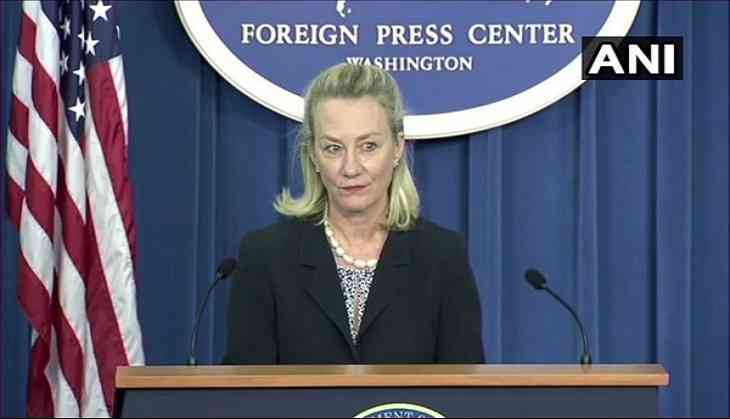
Voicing her concern over the current political turmoil in the Maldives, Principal Deputy Assistant Secretary for South and Central Asian Affairs, Alice Wells asserted that the crisis caused by the emergency imposed in the country has weakened its democratic institutions.
Addressing a press briefing here, Wells said, "The (presidential) elections would be closely watched there (in the Maldives) to see whether it is possible for the Opposition, many of whom have been arrested to contest (in the polls) and to be able to put forward and present an alternative, as is normal in any democratic system to current President (Abdulla) Yameen."
Stressing that the island nation is a key country in the Indo-Pacific framework, she added, "The Maldives is an important country given the volume of the trade and its flow to this area. We have welcomed India's close cooperation with the Maldives. The quality and character of our bilateral relations with the Maldives would be very much be shaped by what we see is happening during the election process."
On February 2, the Maldivian Supreme Court acquitted former Maldivian President Mohamed Nasheed, former Maldivian Vice President Ahmed Adeeb and ordered the reinstatement of 12 other parliamentary members. However, President Yameen refused to follow the top court's order and imposed emergency. He lifted the 45-day state of emergency in March. The Maldivian opposition leaders continue to languish in jails even today.
India and other countries have previously expressed its concern over the political situation in the Maldives and have also called upon the Maldivian government to allow democratic institutions to work in a transparent manner. Civil society members from the Maldives have sought help from the international community to have free and fair presidential elections scheduled to be held on September 23.
On Bangladesh's current political situation, the American diplomat said that Washington has encouraged Dhaka to hold free and fair elections, which reflects the will of the Bangladeshi citizens.
Calling the recent student protests in Dhaka as a 'purest manifestation of democracy', Wells elucidated, "Bangladesh plays an important role to play in the Indo-Pacific strategy with a growing and a dynamic economy. We continue to welcome abilities of all groups in Bangladesh to participate fully in expressing their views and participate in the political process, be it campaigns, rallies and meetings without intimidations or reprisals. We condemn anyone who indulges in violence as a tool in the political process."
On July 29, two students of Dhaka's Shaheed Ramiz Uddin Cantonment College were killed when a speeding bus ploughed through a crowd on July 29. The bus was attempting to overtake another bus when the incident occurred. The deceased were identified as Abdul Karim Rajib (18) and Dia Khanam Mim (17).
Following this, a large number of students took to the streets of Dhaka, demanding improved road safety and stricter enforcement of traffic laws, bringing the city to a complete standstill. Hundreds of students were injured by the police in clashes during the week-long demonstrations.
Facing massive pressure, the Bangladesh Government approved the draft of the Road Transport Act 2018, extending the punishment for rash driving deaths.
The 55-year-old diplomat went on to say that "more stronger and healthier the democratic structure of Bangladesh is, the more appealing it becomes for American investors, which increases the scope to further deepen the partnership, which is our goal."
(ANI)


